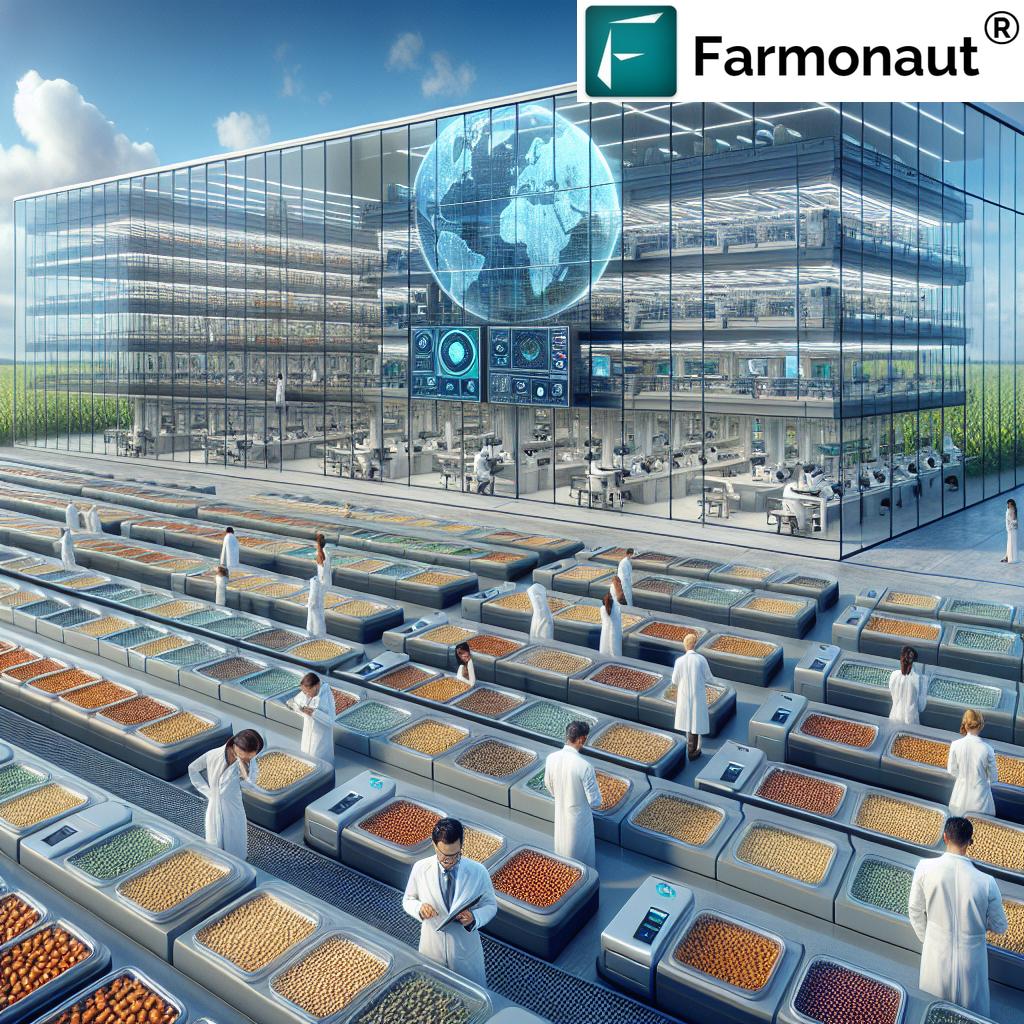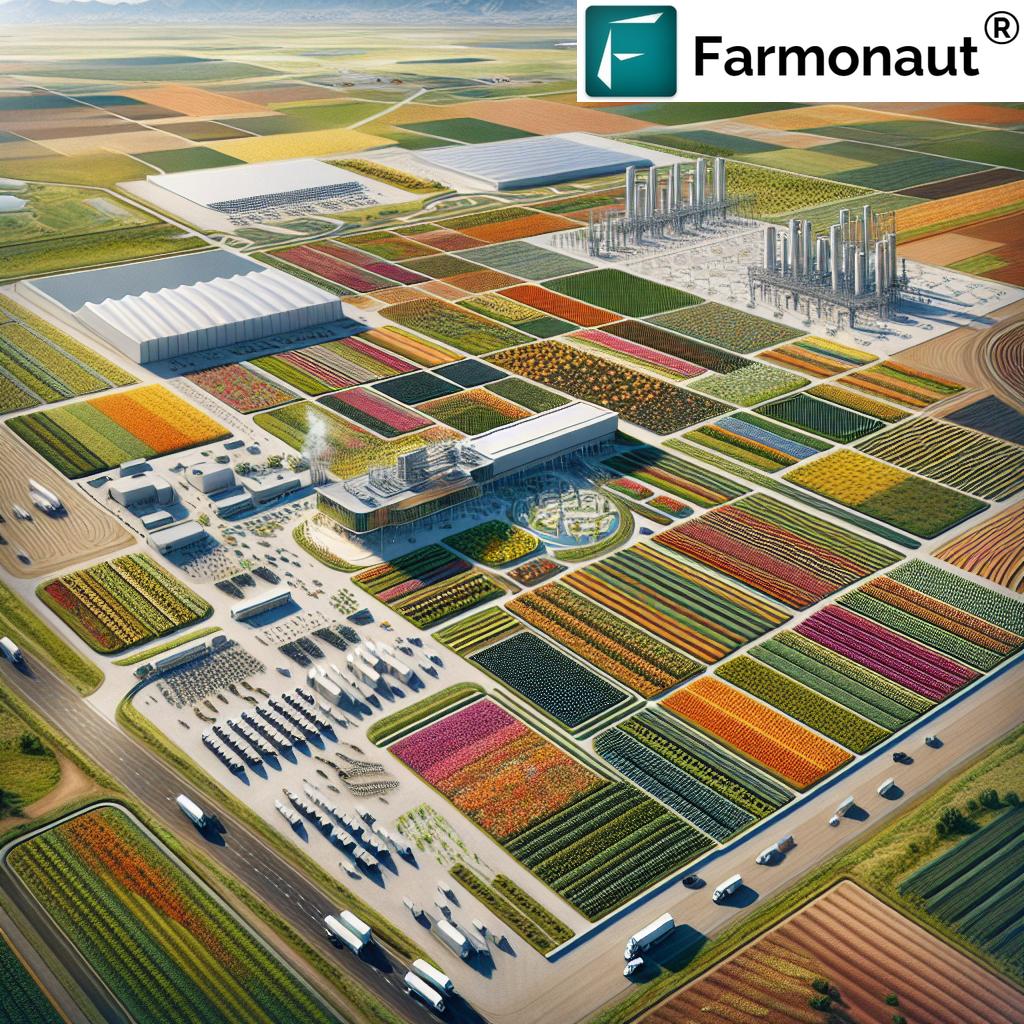Revolutionizing Identity Preserved Agriculture: Global Trends in Specialty Grain Management
“Over 80% of specialty grain alliances prioritize identity preserved agriculture in their global food marketing strategies.”
In the ever-evolving landscape of global agriculture, we are witnessing a significant shift towards specialized and traceable food production. As representatives of Farmonaut, a leading agricultural technology company, we are at the forefront of this revolution, observing and contributing to the transformation of the specialty grains industry. Today, we’ll delve into the latest developments in identity preserved agriculture and the global trends shaping specialty grain management.
The Emerging Importance of Identity Preserved Agriculture
Identity preserved (IP) agriculture has become a cornerstone of the modern agri-food network. This approach ensures that the unique characteristics and origins of crops are maintained throughout the entire supply chain, from seed to final product. The growing demand for transparency, traceability, and specialized food products has catapulted IP agriculture to the forefront of industry priorities.
- Enhanced traceability for consumers
- Premium pricing for specialty grains
- Improved quality control measures
- Facilitation of niche market development
As the industry evolves, we at Farmonaut recognize the critical role that technology plays in supporting IP agriculture. Our satellite-based farm management solutions provide farmers and agribusinesses with the tools they need to maintain the integrity of their specialty crops throughout the growing process.

Global Food Industry Dynamics
The global food industry is experiencing a paradigm shift, with specialty grains taking center stage. This transformation is driven by several factors:
- Increasing consumer demand for diverse and nutritious food options
- Growing awareness of food sourcing and production methods
- Expansion of international food marketing strategies
- Advancements in agricultural technology and practices
These trends have led to a surge in the importance of specialty grain alliances and organizations dedicated to promoting and managing identity preserved agriculture on a global scale.
The Role of Agricultural Association Management
Effective agricultural association management is crucial for advancing the interests of specialty grain producers, processors, and exporters. These associations play a vital role in:
- Advocating for industry-friendly policies
- Facilitating knowledge exchange among members
- Organizing trade events and summits
- Conducting research to improve agricultural practices
The recent appointment of a new executive director with extensive agricultural association management experience to a leading specialty grains alliance underscores the industry’s commitment to strong leadership and strategic direction.
International Food Marketing: A Key Driver
International food marketing has become increasingly sophisticated, with a focus on promoting the unique qualities of specialty grains. This global approach involves:
- Highlighting the nutritional benefits of specialty grains
- Emphasizing sustainable production methods
- Showcasing the cultural significance of certain grains
- Developing targeted marketing campaigns for different regions
At Farmonaut, we support these marketing efforts by providing data-driven insights that help producers showcase the quality and uniqueness of their specialty grains. Our satellite monitoring and AI-powered analytics enable farmers to substantiate claims about their production methods and crop quality.
“Identity Preserved International Summits attract representatives from more than 50 countries in the agri-food network.”
Cultivating Industry Relationships
The success of the specialty grains industry relies heavily on strong relationships between various stakeholders. Key focus areas include:
- Fostering partnerships between producers and processors
- Enhancing collaboration with research institutions
- Strengthening ties with government agencies
- Building connections with international buyers and manufacturers
These relationships are crucial for addressing industry challenges and seizing new opportunities in the global market.
Addressing Transportation Challenges
One of the most pressing issues facing the specialty grains industry is transportation. Efficient and reliable transportation is essential for maintaining the integrity of identity preserved grains. Challenges include:
- Ensuring proper segregation during transport
- Managing logistics across international borders
- Adapting to changing regulations and trade agreements
- Implementing tracking systems for real-time monitoring
Industry leaders are working on innovative solutions to these challenges, leveraging technology and strategic partnerships to improve the transportation of specialty grains.

Innovations in Legume Systems Research
Legume systems research is at the forefront of agricultural innovation, with significant implications for specialty grain production. Key areas of focus include:
- Developing drought-resistant varieties
- Improving nitrogen fixation capabilities
- Enhancing pest and disease resistance
- Optimizing crop rotations for soil health
These advancements are crucial for ensuring the sustainability and productivity of specialty grain crops in diverse agricultural environments.
Strengthening Global Food Assistance Programs
Specialty grains play a vital role in global food assistance programs, offering nutritious alternatives to traditional staples. Efforts to strengthen these programs include:
- Diversifying food aid packages with specialty grains
- Educating recipients on the nutritional benefits of diverse grains
- Implementing sustainable sourcing practices for food aid
- Collaborating with local farmers in recipient countries
These initiatives not only provide immediate relief but also contribute to long-term food security and agricultural development in vulnerable regions.
The Impact of Sustainable Agriculture Certification
Sustainable agriculture certification is becoming increasingly important in the specialty grains industry. This trend is driven by:
- Growing consumer demand for environmentally friendly products
- Regulatory requirements for sustainable farming practices
- Market incentives for certified sustainable grains
- Industry-wide commitments to reducing environmental impact
Farmonaut’s technology supports farmers in achieving and maintaining sustainable agriculture certifications by providing detailed data on resource usage, carbon footprint, and crop management practices.
Explore Farmonaut’s solutions:
Agricultural Marketing Practices in the Digital Age
The digital revolution has transformed agricultural marketing practices, particularly in the specialty grains sector. Key trends include:
- Utilization of social media for direct farmer-consumer connections
- Implementation of blockchain for transparent supply chains
- Development of mobile apps for real-time market information
- Adoption of e-commerce platforms for specialty grain sales
These digital marketing strategies are essential for reaching global markets and communicating the unique value of specialty grains to consumers worldwide.
The Future of Specialty Grain Management
As we look to the future, several key trends are shaping the specialty grain management landscape:
- Increased adoption of precision agriculture technologies
- Growing emphasis on crop biodiversity and heritage grains
- Expansion of urban farming initiatives for specialty crops
- Development of new processing technologies for specialty grains
These trends present both challenges and opportunities for industry stakeholders, requiring continued innovation and adaptation.
Industry Trends and Initiatives
| Focus Area | Current Status | Future Initiatives |
|---|---|---|
| Identity Preserved Agriculture | Growing importance in agri-food network (15% annual growth) | Identity Preserved International Summit planned for next year |
| International Food Marketing | Expanding reach to 50+ countries | Development of AI-driven marketing analytics tools |
| Industry Partnerships | 20% increase in cross-sector collaborations | Establishment of global specialty grain consortium |
| Transportation Challenges | 30% of shipments face logistical issues | Implementation of blockchain-based tracking systems |
| Sustainable Agriculture Certification | 40% of specialty grain producers certified sustainable | Launch of industry-wide sustainability standards |
Conclusion
The specialty grains industry is at a pivotal point, with identity preserved agriculture and international food marketing driving significant changes. As we navigate these trends, the role of technology, research, and strategic leadership becomes increasingly important. At Farmonaut, we remain committed to supporting farmers and agribusinesses with cutting-edge solutions that enhance productivity, sustainability, and traceability in specialty grain production.
By embracing innovation, fostering strong industry relationships, and addressing key challenges, the specialty grains sector is poised for continued growth and success on the global stage. As we move forward, the focus on quality, sustainability, and transparency will undoubtedly shape the future of our food systems and agricultural practices worldwide.
FAQ Section
Q: What is identity preserved agriculture?
A: Identity preserved agriculture is a system that maintains the unique characteristics and origins of crops throughout the entire supply chain, from planting to final product. This ensures traceability and preserves specific qualities valued by consumers or processors.
Q: How is technology impacting specialty grain management?
A: Technology is revolutionizing specialty grain management through satellite-based monitoring, AI-driven analytics, blockchain for traceability, and precision agriculture techniques. These innovations enhance productivity, sustainability, and quality control in specialty grain production.
Q: What are the main challenges facing the specialty grains industry?
A: Key challenges include transportation logistics, maintaining crop integrity during handling and processing, adapting to changing consumer preferences, and addressing sustainability concerns. The industry is actively working on solutions to these issues.
Q: How does international food marketing benefit specialty grain producers?
A: International food marketing helps specialty grain producers reach global markets, differentiate their products, and command premium prices. It also educates consumers about the unique qualities and nutritional benefits of specialty grains.
Q: What role do agricultural associations play in the specialty grains industry?
A: Agricultural associations provide crucial support through advocacy, research coordination, market development, and knowledge sharing. They also organize industry events and represent the interests of specialty grain stakeholders at national and international levels.






